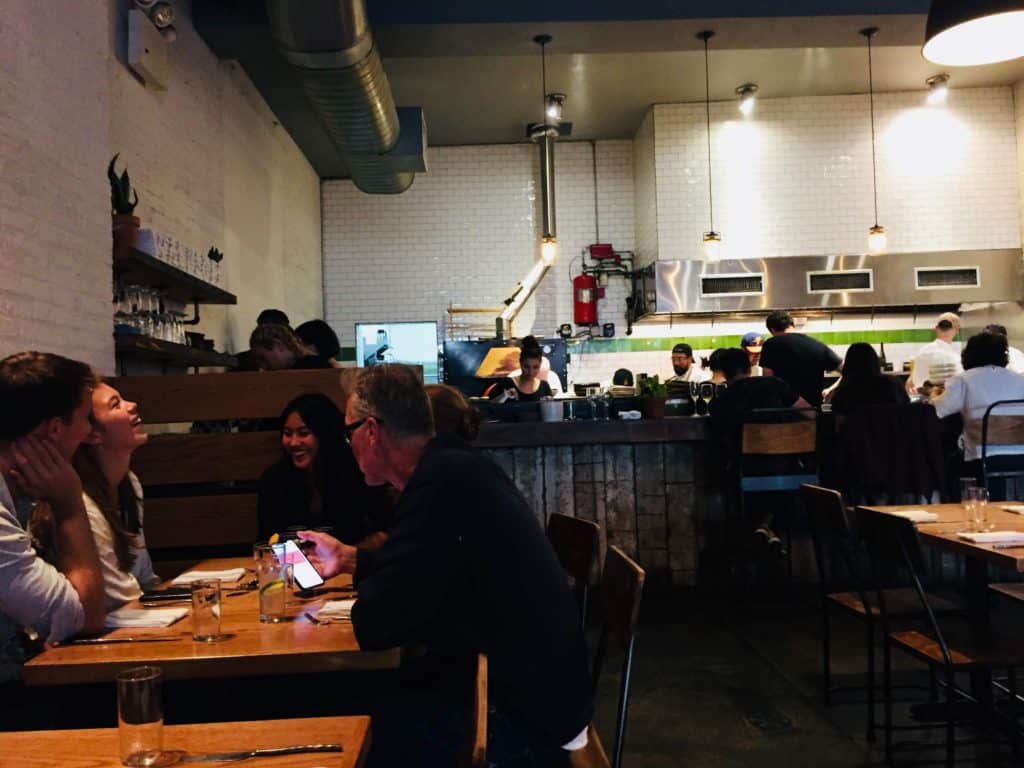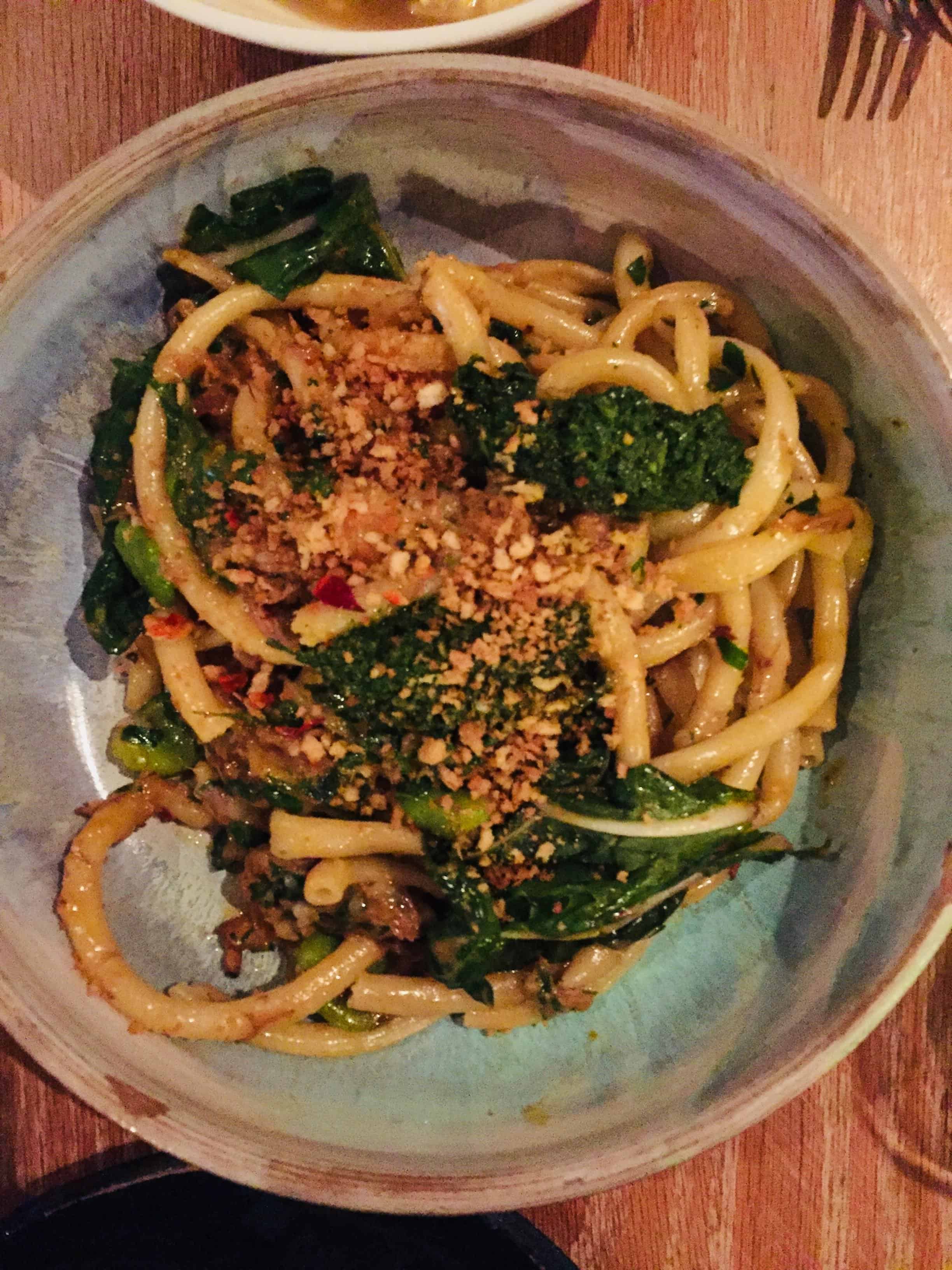Faro, a Michelin-starred dinner-only date spot with a hybrid menu of Italian and New American dishes, serves homemade pasta and precise, mindfully sourced, modern cuisine from a wood-burning oven in a former warehouse near the Jefferson Avenue L stop.
MoMA previously used the building for art storage, but it doesn’t feel as cavernous or austere as it sounds, though it can accommodate up to 50 diners. Located in the North Brooklyn Industrial Business Zone, the space registers, in a relative sense, as a small refuge of warmth and civility in a still largely desolate stretch of Bushwick in the evening. The name means “lighthouse” in Italian, and the open kitchen adds some vitality.
My girlfriend and I tried two of the pastas, an appetizer ($17) and an entrée ($24). I first sampled the agnolotti, which are Gusher-sized ravioli; for all their delicacy, I could have eaten these unadorned little envelopes of ricotta in mushroom broth like a quick morning bowl of breakfast cereal. In truth, I had wanted to get the small plate of culurgiones with foie gras and sweet potato, but it seemed too embarrassing to have to admit in print to having eaten foie gras (which appears twice on the menu, as City Council pursues a ban on the product).
The main course offered supple cords of bucatini so fresh it seemed almost to writhe in an inconspicuously fatty sauce with lamb neck and turnip greens. I washed it down with a draft IPA ($10) from KCBC, just down the street, while my companion enjoyed a splendid gin cocktail ($14) with amaro, chamomile syrup, lemon, honey, and hibiscus from the chef’s farm in Mexico (according to our server).
We also ordered two non-pasta dishes: a high-quality tuna tartare starter ($16, identified only as “tuna” on the minimalist menu), with embedded crouton bits adding the crunch that would normally demand an additional laborious process of spreading the mixture onto baguette toasts; and a delicious plate of three plump scallops ($27) with edible sunflowers and oddly potent Thumbelina carrots.
We finished with an unmemorable German chocolate cake, deconstructed amid decorative smears and screens but otherwise indistinguishable from a convenience store treat. I’ve hardly ever enjoyed desserts at Italian restaurants, and I guess the rule holds true even at Italian restaurants that are actually New American restaurants.
That morning, I had looked online for dinner reservations at Faro, and since it was a Saturday, it didn’t seem unusual to find only two choices: 6:45 or 9:30. I took the early option, but throughout the meal, the restaurant remained mostly unfilled, including the entire middle section, despite the place’s reputation as a foodie hotspot.
 By the end, it felt like a metaphor for the surrounding neighborhood, whose status since about 2012 as perhaps Brooklyn’s hippest feels primarily like a victory of real estate hype. Bushwick South is a normal working-class residential area with some recent injections of hideous luxury housing; Bushwick North, where Faro sits, is in large part a light manufacturing zone, which can also accommodate commercial uses as long as some team of investors has enough capital to turn a dilapidated 20th-century factory into a multi-floor nightclub. But there are no bodegas or laundromats in sight because, notwithstanding a few residential spot rezonings, basically no one lives here.
By the end, it felt like a metaphor for the surrounding neighborhood, whose status since about 2012 as perhaps Brooklyn’s hippest feels primarily like a victory of real estate hype. Bushwick South is a normal working-class residential area with some recent injections of hideous luxury housing; Bushwick North, where Faro sits, is in large part a light manufacturing zone, which can also accommodate commercial uses as long as some team of investors has enough capital to turn a dilapidated 20th-century factory into a multi-floor nightclub. But there are no bodegas or laundromats in sight because, notwithstanding a few residential spot rezonings, basically no one lives here.
The gentrification of homely Bushwick is rightly regarded as a done deal, but that doesn’t mean it already looks like central Williamsburg. For the diners and partiers wandering through its graffitied blankness from one isolated destination to another, it remains confusingly empty thus far. After Faro, just go home.









